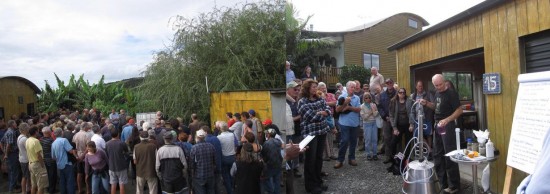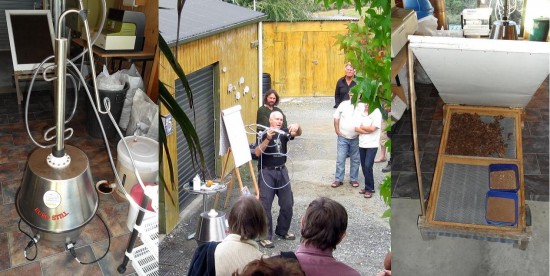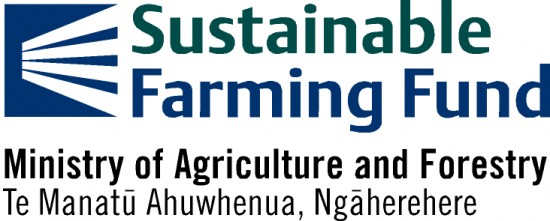The current price of fuel at the pump may have had something to do with the larger than expected turnout (around 100) for the first waste-to-ethanol workshop, held as part of a project to investigate the practicality of turning organic materials into fuel, stock feed and fertiliser. The Far North Environment Centre and Far North Envirolab teamed up to show how a low cost distil system can add value to on-farm waste products by converting them into beneficial by-products including renewable ethanol fuel, animal food and fertiliser.
The presentation and project insight was provided by Andreas from Far North Envirolab. Andreas gave details on the distillation process and how he has refined this to produce a high percentage ethanol product suitable for use as a transport fuel. Various feed stocks were discussed including waste kiwifruit, avocado waste (post oil-extraction) persimmons and raupo. The relationship between sugar content (measured by the Brix Test) and the amount of ethanol produced from a given feed stock was also covered. Energy inputs, both for the transport of the feed stock and for the actual distillation process, were noted as an issue and Andrea’s use of solar energy was suggested as a starting point to address this. Following the presentation, Andreas fielded questions and discussion was fuelled by participants’ enthusiasm and clear intentions to ‘have a go’ themselves.
The next phase of the project sets out to develop and distribute a basic manual outlining the basic processes and procedures of the working model. The project also aims to encourage on the ground uptake of similar projects and is looking to hear from interested parties. For more information on the project click here, or to email Richard from the Far North Environment Centre please click here.
The project has been partly supported through the Sustainable Farming Fund which is administered by the Ministry of Agriculture and Forestry




Comments
I really enjoyed country calendar with Andreas. I would be really keen to learn how to make ethanol from biodegradeable waste products. I have converted diesel cars to run on used vege oil and I have converted a tractor to run on ghee. So I am really keen to convert a car to run solely on ethanol as I think it is one of the better fuels.
So could you let me know when I could come up for a training session and what the cost would be. I did note that he was using a blend, was that deliberate or was it because the car would have some difficulty operating on 100% ethanol without modification?
Thanks
James